Filter By:
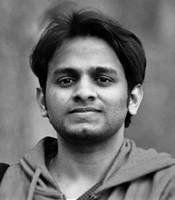
Research Area / Title:
Evolving Design Heuristics for Graphical User Interfaces (GUI) of Smart Devices – A Semantic Design Approach
Supervisor: Prof. Pradeep Yammiyavar
Email: v.varala@iitg.ac.in, varalas07@gmail.com
Year of joining: 2012
My Research falls in the area of HCI and Graphical User Interface Design (GUI) of smart future products. This research is trying to identify the gaps with respective to the communicability of the Interfaces across the diverse user groups in India. Through a User Centric Design (UCD) approach involving knowledge and methods from multidisciplinary areas such as Design Semantics, Perceptual Studies, HCI, this research is trying to propose a design methodology and heuristics for GUI design of future smart products such as Internet of Things (IoT) enabled Product Interfaces. This work is aiming at improving the communicability of the Interactive products across various Indian Use groups irrespective of their background such as educational literacy, Technology Literacy etc.

Research Area / Title:
Visual Design, Children's Literature
Supervisor: Prof. Ravi Mokashi Punekar
Email: ashish.yadav@iitg.ac.in, ashishk.iitg@gmail.com
Year of joining: 2013
My research interest includes Visual Design and visual analysis of children’s literature. I am interested in the analysis of visual elements, text and image comprehension in children’s literature in a vernacular language such as the Hindi language. My study helps in the current scenario to develop better learning aids as well as guidelines, which can help to produce better study material.
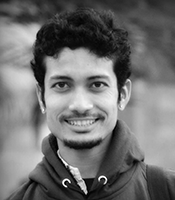
Research Area / Title:
Impact of Architectural components in Learnability of School Children
Supervisor: Prof. Ravi Mokashi Punekar, Prof. Avinash Shende
Email: jyotirmoy@iitg.ac.in, pathakjyotirmoy@gmail.com
Year of joining: 2014
Human body is among all the complex systems studied by mankind, and the human brain is the most complex of all. From decades, study has been done, and will continue with the race. Further to ease these kind of studies, many other branches has emerged, and as a result specialized study is being done by people in different fields. My research deals with children of specific age group (6-9 years), as it is the most receptive age group, along with the various architectural components which may impact their learnability.

Research Area / Title:
Temporal Urbanism
Supervisor: Prof. Amarendra Kumar Das
Email: d.anusmita@iitg.ac.in, anusmitadas.design@gmail.com
Year of joining: 2014
Cities around the world have marked differences in spatial form and structure. To some extent this can be attributed to cultural differences. Every city has its own identity and culture manifested through its people and activities that occur in its urban spaces. In a time where change is the norm, cities are increasingly facing issues of identity wherein urban spaces are gaining new meanings and functions with changes in cultural practices. An analysis is particularly relevant in India, where multicultural identities manifest themselves in the socio-cultural life of its people through the multitude of festivals celebrated in its urban fabric. This research analyses the effects of temporal events such as festivals on the urban form of a city. The central concern of this research is to develop a critical stance of urban spectacles in a bid to highlight the underlying concerns of meanings of local festivals and their manifestation on identity and spatial structure of a city.

Research Area / Title:
Innovation in Handloom sector for its sustainability
Supervisor: Prof. Amarendra Kumar Das
Email: umme.hani@iitg.ac.in, umzhan@gmail.com,
Year of joining: 2014
Eri culture in Assam is practiced since time immemorial. It was accomplished as home based agro industry to meet domestic prerequisites. Eri weaving was purely traditional and leisure time activity. Eri cocoons were mostly popular as delicacy among the tribal people of this region. Eri silk has got worm quality and it used to replace the woolen threads among various tribes. Eri was considered as ‘poor man’s silk’ because it used to be the cheapest of all silks. Today, in this comprehensive market, the increasing demand of eri silk is remarkable. There has been an enormous role of Entrepreneurs, Textile Designers, NGOs etc. towards this change. This revolution has shaped the traditional system into a commercial business. This evolution of eri silk can raise certain concerns regarding the retention of the cultural heritage of this practice. The aim of this study is to comprehend the role of designer in this practice towards creating a global demand and also to understand how can design education help in sustaining a balance between tradition and demand.

Research Area / Title:
Industrial Design Considerations in Product Integrated Photovoltaics (PIPV) for Rural Communities of India
Supervisor: Prof. Ravi Mokashi Punekar, Prof. Avinash Shende
Email: pranav.satpute@iitg.ac.in, pranav.dod@gmail.com
Year of joining: 2015
Off grid applications of Photovoltaic technology brings product-integrated photovoltaics (PIPV) in the picture. Although, various possible applications of PIPV envisage but there are very few products designed and available in the market due to under explored. This scenario implicates that there is a need of intervention of multi- disciplinary experts including Industrial designers in this field. It is observed that very few new applications of PIPV are commercialized in Indian market. Also, Less penetration of it in rural market is fairly evident. Based on the fact of huge population resides in rural India where accessibility to the electricity is still a major challenge, the initial study was planned to begin with the field studies in villages where conceptual design intervention in PIPV has been envisage through involving Industrial designers. Research involves various studies covering aspects of Industrial Design of PIPV for Rural communities of India.

Research Area / Title:
A correlational study between the subjective and objective (eye tracking) measures during the evaluation of visual classical aesthetics
Supervisor: Dr. Sougata Karmakar
Email: bighna@iitg.ac.in, k.bighna@gmail.com
Year of joining: 2015
The process of having an aesthetic experience is a very complex cognitive phenomenon. Objectivist view inspired many psychological attempts to identify the critical contributors of aesthetics (beauty) such as balance and proportion, symmetry, informational content and complexity, contrast, clarity, order, number of elements, symmetry, colour, brightness. Literature also reveals that various factors like aesthetic attitude, semantic consistency, time, knowledge, familiarity, and affectivity have a significant influence on the aesthetic appraisal. The aim of this research to explore the potentiality of the eye tracking research considering the past implications, recent developments, and relevant future growth in the field of visual aesthetic evaluation.

Research Area / Title:
A study on the Perceptance and Acceptance of wrist-worn Wearable Fitness Tracker and Design Intervention Models for Enhancing the Prolonged Use of the Devices Ensuring a Healthy Ageing
Supervisor: Prof. Debkumar Chakraborti
Email: swati.sarkar@iitg.ac.in, swatisarkar19@gmail.com
Year of joining: 2015

Research Area / Title:
Input Methods for Virtual Reality
Supervisor: Dr. Keyur Sorathia
Email: shimmila@iitg.ac.in, shimmila.bhowmick@gmail.com
Year of joining: 2016
My research area explores input interaction techniques specifically gesture based input interaction technique for Head Mounted Display (HMD) based Virtual Reality (VR) interfaces.

Research Area / Title:
Development of Affordable Tools for Metal Handicraft Products in Northern-Eastern Region
Supervisor: Dr. Pratul Ch. Kalita
Email: kiranmahato2011@iitg.ac.in, kiranmahato2011@gmail.com
Year of joining: 2016
The basic motivation of the study is to improve the quality of life of the people working in the handicraft sector special emphasis on metal craft of Assam, through design intervention in tool design with application of appropriate technology. A case study of brass and bell metal manufacturing industry of Assam has been considered for this research. This research is carried out to improve the various process involved in brass metal craft manufacturing process with tool design intervention. Initial field study was conducted to identity and priorities the scope of design intervention in tool design to ease the manufacturing process of brass and bell metal craft. It comprised of study of existing manufacturing process, tools and machinery involved and problems associated with existing process. Concepts were developed based on appropriate technology. For refinement of concepts, CAD model and prototype will used. The CAD models will validate and tested with workers.

Research Area / Title:
Culture and Emotions
Supervisor: Prof. Utpal Barua
Email: b.nilutpal@iitg.ac.in, nil90borgohain@gmail.com
Year of joining: 2016
It is seen that each community/locality/ethnicity showcases an emotive communication method which can range from wardrobe, food to architecture etc.. The aim here is to bind these factors in a common, easily comprehensible thread.

Research Area / Title:
Ergonomic Intervention in Manually Operated Implement Used in Agriculture
Supervisor: Dr. Sougata Karmakar
Email: jiteshsingh@iitg.ac.in, jiteshsingh9@yahoo.com
Year of joining: 2016
Agriculture is one of the important sectors, it not only fulfills the food demand but also a source of income to the people involved in it. Agriculture is considered as the backbone of the developing country. Increasing population and food demand is always a matter of importance. Agriculture is now becoming mechanized but still, many farmers do most of the agricultural practices manually (using hand or hand tools). Several of these farm activities are time-consuming and causing fatigue. Ergonomically designed hand tool can be helpful to enhance the productivity of such small farmers facing an economic constraint.

Research Area / Title:
Retention of Ethnicity and Pursue Innovation
Supervisor: Dr. Sougata Karmakar
Email: chirapriya@iitg.ac.in
Year of joining: 2016
Innovation is inevitable for any product design and manufacturing to withstand in the competitive market. During the process of innovation, many a time ethnic product loses its traditional characteristics (look, feel etc.) and thus create or evoke an altered emotional response of the consumers and negatively affect product purchase intention. To retain ethnicity of a product, it is very crucial to identify the emotional values embedded in the ethnic product and keep its traditional design elements unaltered.

Research Area / Title:
Interaction Design for Handheld Flexible Display Devices
Supervisor: Dr. Keyur Sorathia
Email: borah176105003@iitg.ac.in, pranjalborah777@gmail.com
Year of joining: 2017
Flexible thin-film OLED displays and recent development in flexible circuitry provides an opportunity to use the flexibility of the display as a mean to provide input. My research work focuses on input interaction techniques for future handheld flexible display devices.
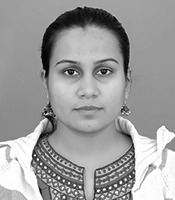
Research Area / Title:
Digital Technology in Indian Printing
Supervisor: Prof. Utpal Barua
Email: namri176105004@iitg.ac.in, namritasharma06@gmail.com
Year of joining: 2017
My research will be an intervention into how various adaptations and innovations which took place and are taking place in this field. It will be an insight into various works of art which led to revolution in the Indian Printmaking.The insights will include experimentation with forms, process, technical advancement, combination of traditional and advance methods, representational innovations and future potential of this medium.
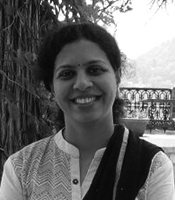
Research Area / Title:
A Study of Body Gestures-based Input Interaction for Locomotion in HMD-VR Interfaces in a Sitting Position
Supervisor: Dr. Keyur Sorathia
Email: priya176105001@iitg.ac.in, priyaganapathy@gmail.com
Year of joining: 2017
The recent advent of low cost wearable displays coupled with high end motion sensing devices is leveraging the design of immersive and highly interactive virtual environments. In such virtual worlds, the human-computer interface, and particularly the navigation technique, plays a crucial role. Navigation is one of the primary task in order to sense the immersive nature and the presence of the virtual world. There are various navigation techniques available for the usage locomotion in the VR environment. It depends on the type of application and the users of the environment. My research aims at finding the suitable kind of locomotion technique for the application chosen and designing guidelines for development based on the user group.

Research Area / Title:
Framework for Designing Post Disaster Transitional Shelters and Settlement
Supervisor: Prof. Amarendra Kumar Das
Email: dev176105005@iitg.ac.in, kankana.dev@gmail.com
Year of joining: 2017
The built environment today is affected more and more by the rapid and extreme changes due to human-made and natural disasters. These disasters often lead to displacement of people until the reconstruction of the damaged habitats. There are several stages of Disaster Relief Shelter one being “Transitional Shelters and Settlement”, where displaced population resides for a particular (short) period till they can shift to their reconstructed habitats. The research has been designed to understand what Transitional Shelters and Settlement entails; the key concepts that constitute them and how they can be implemented in the context of Assam, a northeastern state in India, very vulnerable to disasters.
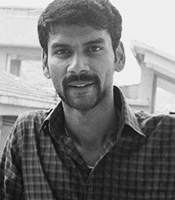
Research Area / Title:
Design for construction workers safety
Supervisor: Dr. Urmi Ravindra Salve
Email: c176105104@iitg.ac.in, vigneshkumarchellappa@gmail.com
Year of joining: 2017
Accident rates of construction industry in India is highest among all other industries, affecting macro to micro level projects and needs a comprehensive tools to prevent accidents to construction workers among all levels of projects. Thus, safety in construction industry becomes a serious issue among practitioners, academics, the public and the government. Therefore, preventing accidents on construction workplace has become a great challenge for stakeholders which need a new approach. Due to the recent improvement in visualization technology, the design approach adopted in my research is to prevent workers from accidents in Indian construction projects through construction virtual prototyping.

Research Area / Title:
Human Computer Interaction
Supervisor: Dr. Debayan Dhar
Email: nandi176105102@iitg.ac.in, nbhanja.chaudhuri@gmail.com
Year of joining: 2017
Nowadays, the information, signals like sound, music that are available around us is subjective in nature containing emotions, personal feelings, tastes, opinions, etc. It is very useful to analyse these information from the perspective to draw useful conclusions out of it. My research mainly focuses on to predict the patterns of these signals and make useful contributions in the field of design and human computer interaction.

Research Area / Title:
Ergonomics
Supervisor: Dr. Swati Pal
Email: krish176105103@iitg.ac.in, mkchaitanya555@gmail.com
Year of joining: 2017
In Ergonomics, the interaction between user and machine is so vital. It is the path to improve quality of work life and enhance productivity. The Design of unexplored areas of ergonomics will boost the occupational health, safety and well being of workers.

Research Area / Title:
Design Ergonomic Interventions in MSME's
Supervisor: Dr. Sougata Karmakar
Email: singh176105105@iitg.ac.in, phdgur@gmail.com
Year of joining: 2017
Design Ergonomic Interventions in MSME's especially in Fast Moving Consumer Goods (FMCG) industries plays a vital role in enhancing the overall productivity of the firm in addition to the overall enhancement of the worker's well-being and safety. Such interventions focus on determining the bottlenecks present in workplace which lowers the productivity and poses danger to the workers engaged there. Time-motion Studies, Digital Human Modelling and Applied Ergonomics Principles being the backbone of such studies. In the present context, such studies being the need of hour in the North-eastern states like Assam where such industries are in the commissioning phase and will witness tremendous growth in the forthcoming years.

Research Area / Title:
Smart City – In Indian purview
Supervisor: Dr. Pratul Ch. Kalita
Email: abhis176105101@iitg.ac.in, abhisheksingh.projects@gmail.com
Year of joining: 2017
The race of smart cities around the globe has end up making numerous ghost towns. Where technology and smart philosophies have been adopted successfully but people are missing. It is important to understand that the smart city concept varies from place to place and society to society depending on their requirements. The overall goal may be the same but in race of technology we cannot neglect the emotional, social and psychological aspects of the city. In case of India where 85% of the working population belongs to unorganized sectors and these smart cities are probing towards the mall culture, where the small scale vendors and service providers are facing huge decline in their earnings. So this research is on rethinking the smart city concept in Indian Context and how can we make it more people inclusive. To ensure that people of all segments are part of the smart city and can live a sustainable life with good growth opportunities in it.

Research Area / Title:
Shaping Emotions: Development of An Emotive Form Design Framework for Products
Supervisor: Dr. Pratul Ch. Kalita
Email: gaurav.vaidya@iitg.ac.in, vaidyagaurav24@gmail.com
Year of joining: 2018
Nowadays consumers are increasingly becoming market aware. Functionality and usability of products are more or less taken for granted by these new age consumers and their search is for fulfilment of higher-order needs i.e., emotional needs. To serve consumers’ emotional needs, a product must communicate with them at emotional level. Products connect with the consumers at the emotional level first through their appearance and visual features. Therefore, the role of emotions in visual design of product has gained attention of design researchers in recent years. Many researchers have argued that the emotional element of design might be more crucial in deciding the success of the product than the functional element as it affects consumer’s decision making in choosing a product. Through our research, we intend to propose an Emotive Form Design Framework, and try to initiate discussions on effectiveness the framework in evoking intended emotions in consumers through product appearance. It is expected that design students, practitioners, cognitive scientists, ergonomists would find the framework helpful while designing emotional products.

Research Area / Title:
Efficient healthcare delivery system focusing on the underserved North Eastern region of India
Supervisor: Prof. Amarendra Kumar Das
Email: kakati18@iitg.ac.in, abhi.kakati@gmail.com
Year of joining: 2018
Providing quality eye care services in rural and remote communities has always been considered daunting. People living in such remote places are often vulnerable to several ocular abnormalities arising from work-related injuries, aging, and complications arising from non-communicable diseases like diabetes. The current practices for delivering eye care services to the remote population are through community outreach camps. These camps have remained an integral part of the underserved population for access to eye care services. The rural population relies on such health camps for their well-being. It is, however, pertinent to mention that not much research has been done in improving the conditions for undertaking eye screening camps in these areas. My research focuses on optimizing the eye care service delivery in the community outreach health camps using design methodologies and principles of ergonomics.
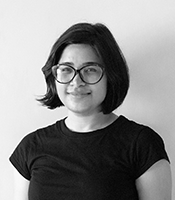
Research Area / Title:
Bamboo Furniture Design for the Millennial Generation
Supervisor: Prof. Amarendra Kumar Das
Email: monikunt@iitg.ac.in, monikuntala22@gmail.com
Year of joining: 2018
Bamboo is a sustainability promising, rapidly renewable, locally available backyard grass in the North East Region of India. Out of its multiple craft variations, bamboo furniture design through small and medium enterprises have not yet been able to satisfy current generation needs to thrive in the market against other competitive furniture materials. The research entails a comparative Life Cycle Assessment of the materials wood, steel, plastic and bamboo to understand relative eco-friendliness of products. The research also includes development of collapsible techniques with the material bamboo to support transient nature of the Millennial generation.

Research Area / Title:
Designing turn-taking for voice user interfaces
Supervisor: Dr. Abhishek Shrivastava
Email: mridumonip@iitg.ac.in
Year of joining: 2019
To achieve human like fluent turn-taking behavior for voice user interfaces(VUIs) while taking part in conversation with human user is a substantial body of research. Researchers of the field constantly trying to achieve this goal by working upon different human factors like back channels, prosody, gaze, syntax, semantics, gesture etc arises during conversation. Although their efforts have made the industry to achieve the goal to some extent but achieving human-like fluency in turn-taking without making any error have not been possible till date. Literature proves that human-lower-level temporal behavior arises during conversation play a very crucial role in the turn-taking organization. We believe that realizing those temporal behaviors technically and manipulating them to well understand their role in the organization of turn-taking is the key to achieve successful turn-taking between human and machine.

Research Area / Title:
Development of Assistive Teaching Tool for the Children Living with ADHD
Supervisor: Dr. Abhishek Shrivastava
Email: s.phalke@iitg.ac.in, sanamigo002@gmail.com
Year of joining: 2019
Attention Deficit Hyperactivity Disorder (ADHD) affects 6.3 – 8.8 percentage of the total pediatric population in India. This makes ADHD as one of the major disorders in India. Thus, it becomes necessary to design and develop novel and effective treatments for the children living with ADHD. Thus, in this we act on to develop an assistive teaching tool for the treatment of children living with ADHD. Children living with ADHD face a number of behavioural and academic problems. These children have difficulty with classroom attention, have lower sitting span, weak gross an fine motor skills, and learning difficulties. Thus, we propose to develop an effective assistive digital product that will help teachers and parents to treat the children living with ADHD. The main aim of this tool is to enhance the classroom sitting time, concentration span and improve the basic learning skills in terms of reading, writing and pronunciation only.

Research Area / Title:
Development of a sustainable design assessment framework focused on the socio-cultural aspects of the residential sector
Supervisor: Dr. Pratul Ch. Kalita
Email: kpiparsania@iitg.ac.in, kratika.piparsania@gmail.com
Year of joining: 2019
Globally, building floor space has expanded 65% since 2000, while energy/m² has improved by only 25%. India experiences the fastest relative growth in per person residential energy use because of increased access to energy sources and increased use of appliances. India's urban population increased from 290 million in 2001 to 378 million in 2011 and projects to reach 590 million by 2030. In 2017, approximately 272 million urban households were projected in India, increasing to 328 and 386 million by2027 and2037. The residential sector floor area is likely to rise 21.9 billion m2in the next ten years from 15.3 billion m2in 2017. Building design and construction can enhance the comfort levels considerably if built in a climate-sensitive manner. National Building Code, Model Building Bye-Laws, and various green building rating systems emphasize building sustainably by integrating climate responsive design elements that are low cost and energy-efficient. Sustainability within any research field or practice requires measuring the aspects representing the progress of such development. How to measure sustainability represents a major challenge for implementing solutions in the built environment, mainly because there is no universally agreed list of indicators. Thus, the United Nations proposed the 'three pillars' framework for sustainable development. However, the three-pillar model faces criticism for being loosely defined and too conceptual. The definition also lacks many intangible and human cultural aspects, which significantly influence human life in general and policymaking. Despite this, sustainability indicators remain helpful as they represent environmental, economic, social, and cultural factors. Elements of sustainable design are integral to vernacular architecture that has evolved using local materials and technology. These emerged from ambient natural and cultural environments creating optimum relationships between people and their place. The strength of vernacular architecture comes from its ability to blend and adapt buildings into their native context. The built environment must become a fundamental part of the ecosystem and ensure the relationship between cultural and natural processes. The SA indicators primarily focus on building, and urban sustainability are majorly quantitative and physical indicators with implicit social attributes. Thus, the gap persists due to the neglect of socio-cultural aspects for developing a culturally responsive design. This research examines the potential for better integration of the tangible and the non-tangible aspects of vernacular architecture for socio-cultural sustainable developments. The principles of vernacular housing can provide the foundation to explore this alliance, with an approach to incorporate the economic, socio-cultural, and environmental regulations.
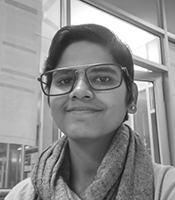
Research Area / Title:
Universal Design
Supervisor: Dr. Sougata Karmakar, Dr. D. Udaya Kumar
Email: y.priyanka@iitg.ac.in, priyankayadav.d@gmail.com
Year of joining: 2019
I am working in the area of Universal Design. My work focuses on making educational institutes universally accessible to reach an equitable society.

Research Area / Title:
Design for Do-It-Yourself in Emerging Countries for the Rural and Semi-Urban Context
Supervisor: Dr. Sharmistha Banerjee
Email: prarthana.majumdar@iitg.ac.in, prarthana.majumdar@gmail.com
Year of joining: 2019
The coming of the Maker Movement brought in a new wave in human history. From mass production and passive consumerism, the production systems of the society moved to more personalized and identity creating forms. Hence, the Maker Movement and Do-It-Yourself (DIY) have been widely studied by scholars to either understand its repercussions on conventional production-consumption systems or the motivations behind it. However, not much research has been conducted on understanding what DIY is in the context of the Emerging countries, a segment which consists of more than half of the global population. Though MIT opened FabLabs around the world, the question persists whether a deeper contextual understanding of DIY in these communities is necessary to give meaning to these physical spaces. In our research, we focus on rural and semi-urban India and study the DIY motivations and behaviorism of young subjects who are in their early teens.We seek to understand how a DIY product can be developed for them such that holds it motivational meaning for the subjects and facilitates adoption of the DIY practice. We further contemplate on how the practice can be diffused in the community of young subjects. Toward this end, we seek to understand how the social network structure of the community of young teens can be tapped and dissemination material can be designed such that knowledge of the practice diffuses naturally in the network.
Imparting a Maker Culture is as much about understanding what making means to a makers as it is to impart skills and provide tools.

Research Area / Title:
Ergonomics
Supervisor: Dr. Urmi Ravindra Salve
Email: arun_mangal@iitg.ac.in
Year of joining: 2019

Research Area / Title:
Biomedical innovation and implementation process
Supervisor: Dr. Debayan Dhar
Email: neelarnab_dutta@iitg.ac.in, neelarnabd@gmail.com
Year of joining: 2019
My doctoral research works aimed at formulating a new design process for health technology innovation and implementation in an increasingly challenging socioeconomic and regulatory environment like that of India, by conducting detail research on India centric health technology innovation and implementation challenges, identifying parameters for culturally competent healthcare intervention and understanding scope of assistive technologies like Artificial intelligence in addressing such issues and barriers.

Research Area / Title:
Smart Home Product Service System Design
Supervisor: Dr. Pratul Ch. Kalita
Email: g.leeladhar@iitg.ac.in, leeladhar.ganvir@gmail.com
Year of joining: 2019

Research Area / Title:
Indoor Environmental Quality (IEQ) of naturally ventilated educational building
Supervisor: Dr. Shakuntala Acharya
Email: abdul_mohsin@iitg.ac.in
Year of joining: 2020
Indoor environmental quality (IEQ) is important for work force performance and productivity. It has four major parameters namely: thermal, visual, acoustic and Indoor air quality (IAQ). There are sufficient studies of individual IEQ parameters, but very limited studies have done a combine analysis. Thermal is the most studied parameter due to its great impact on occupant comfort. Visual comfort is associated with adequate daylight in an indoor environment which has both physical and psychological benefit. The effect of noise on humans are reflected in psychological effects such as nervousness and decrease concentration. IAQ of a space have significant impact on occupant health. Studies which have done a combined study have shown that only thermal comfort and indoor air quality have the greatest inter-dependency as they share some of the physical parameters. To the best of author knowledge there is no study which has explained the impact of IEQ parameters for different climate and context, therefore this study aims to do the same. It was found that, in conventional naturally ventilated educational building that thermal comfort has the highest impact and visual comfort has the least impact, irrespective of the climate, while IAQ highly depends on climate and acoustic comfort highly depends on outdoor physical context.

Research Area / Title:
Comparative Visual Study of Traditional & Contemporary Folk Paintings and their Applications in Transmedia
Supervisor: Dr. Sougata Karmakar, Dr. D. Udaya Kumar
Email: saurav.sharma@iitg.ac.in, saurav.sharma602@gmail.com
Year of joining: 2020

Research Area / Title:
Supporting decision-making towards Sustainable Smart City Planning in Northeast (NE) India
Supervisor: Dr. Shakuntala Acharya
Email: t.bordoloi@iitg.ac.in, ar.trishabordoloi@gmail.com
Year of joining: 2020
Smart cities have emerged as a possible solution to sustainability problems deriving from rapid urbanization. They are considered crucial for a sustainable future. A smart city intends to make itself ‘smarter,’ more sustainable, efficient, equitable, and liveable. The objective of smart cities intends to build future cities into a better quality of inhalants, easy connectivity, access, transportation and technology, and efficient use of resources that is called liveability, workability, sustainability respectively. The Northeast region of India is world known for its cleanliness and natural attraction of tourism. Cities and towns in the Northeast region face the problem of socio-economic underdevelopment and insecurity. This region does not have proper infrastructure facilities such as wastewater, solid waste management, sanitation, drinking, and public transportation. However, some areas of the Northeast region are slowly developing and others are underdeveloped. The doctoral research work intends to investigate the factors and preparation of guidelines that will help Northeast India towards sustainable planning and development along with the advancement of ICT as well as retaining its natural beauty.

Research Area / Title:
Role of Advertising in Social Marketing in Shaping the Pre-Dominant Mental Models
Supervisor: Dr. Pratul Ch. Kalita
Email: akanksha.dd@iitg.ac.in, akanksha.sg14@gmail.com
Year of joining: 2021

Research Area / Title:
Ergonomics in work area design
Supervisor: Dr. Urmi Ravindra Salve
Email: dubesh.sai@iitg.ac.in, dubesh.sai@gmail.com
Year of joining: 2021

Research Area / Title:
Discovering the tangibles and intangibles of a tea landscape for a cultural heritage based tourism development: A perspective from Assam
Supervisor: Dr. Shakuntala Acharya
Email: b.amarendra@iitg.ac.in
Year of joining: 2021
The research aims to propose a framework for studying and documenting heritage values in tea landscapes, along with the creation of interactions and experiences, rooted in the ethos of sustainable tourism. This novel intervention is poised for Assam; the world's largest contiguous tea landscape; witnessing in recent years a growing impetus towards the development of tourism.

Research Area / Title:
Visual Communication
Supervisor: Dr. D. Udaya Kumar
Email: t.greg@iitg.ac.in
Year of joining: 2021

Research Area / Title:
City Branding and Visual Design
Supervisor: Dr. D. Udaya Kumar
Email: parichita.mohapatra@iitg.ac.in, parichita86@gmail.com
Year of joining: 2021

Research Area / Title:
Craft and Sustainability
Supervisor: Dr. Sharmistha Banerjee
Email: shivramkumar@iitg.ac.in, mechsippu@gmail.com
Year of joining: 2021

Research Area / Title:
Ergonomics
Supervisor: Dr. Sougata Karmakar
Email: j.vaijnath@iitg.ac.in
Year of joining: 2021

Research Area / Title:
Design Education and Aesthetic Studies
Supervisor: Dr. D. Udaya Kumar, Dr. Shakuntala Acharya
Email: k.prajakta@iitg.ac.in, prajakta.spark@gmail.com
Year of joining: 2021

Research Area / Title:
Cognitive Ergonomics
Supervisor: Dr. Urmi Ravindra Salve
Email: b.riddhiman@iitg.ac.in, biswasriddhi9@gmail.com
Year of joining: 2021

Research Area / Title:
Studies in Comics
Supervisor: Dr. D. Udaya Kumar
Email: m.arbaniabud@iitg.ac.in
Year of joining: 2021

Research Area / Title:
Design of assistive devices in resource constraint settings
Supervisor: Dr. Shakuntala Acharya
Email: v.kavyashree@iitg.ac.in
Year of joining: 2022

Research Area / Title:
[To be updated soon...]
Supervisor: Dr. Keyur Sorathia
Email: v.mohite@iitg.ac.in
Year of joining: 2022

Research Area / Title:
[To be updated soon...]
Supervisor: Dr. Pratul Ch. Kalita
Email: b.mali@iitg.ac.in
Year of joining: 2022

Research Area / Title:
Human Computer Interaction
Supervisor: Dr. Abhishek Shrivastava, Dr. Sougata Karmakar
Email: s.syamala@iitg.ac.in, syamasarath2010@gmail.com
Year of joining: 2022